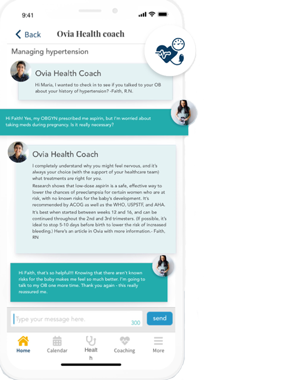- Patients Patients
Reproductive Genetics Testing
Patient Resources
Cost & Billing
- Providers Providers
- Genetic Counseling
- Login Login
- Estimate My Cost

Take charge of your health
Annual wellness exams are for women of all ages
As a woman, you need special exams and screenings throughout your life to protect your overall health and wellness.
Women’s Wellness Exams
A well woman exam provides you with key information so you can make informed decisions about your health. The exam includes a full physical exam, as well as a number of health screenings, vaccinations, blood tests and more.1
Your wellness exam should be a priority every year—even if you feel fine—to avoid medical issues in the future. Dividing a women’s life cycle into four age groups to help understand what screening you need.
Wellness can blossom at every age with preventive care
Well woman visits focus on preventive care. Part of your visit may involve getting a screening test, which is one of the most important things you can do for your health.

Young women who are not sexually active should have their first women’s wellness exam between the ages of 13-15, with annual visits thereafter. Your first visit generally does not include a pelvic exam, instead your doctor will likely become familiar with your medical history, including menstrual history and body mass index (BMI). It is important to talk to your doctor about what screening tests are right for you.
Periodic screening tests your doctor might perform
- Lipid screening
- Gonorrhea screening
- Chlamydia screening
- Hepatitis B screening
- HIV screening (ages 15 and older)
- Syphilis screening

At this age, you may visit your doctor for an annual wellness exam to inquire on contraception, pregnancy and cervical cancer screening. It is also important to screen for obesity, diabetes, hypertension and autoimmune disease (e.g., arthritis).
Regardless of sexual history, women aged 21 and older should have a Pap smear every three years. The Pap smear looks for signs of cervical cancer. Talk to your doctor about what cervical screening frequency is right for you.
Periodic screening tests your doctor might perform
- Lipid screening
- Gonorrhea screening (ages 24 and younger)
- Chlamydia screening (ages 24 and younger)
- HIV screening (ages 15 and older)
- Cervical cancer screening (ages 21-29 every three years, ages 30 every five years)
- Genetic testing (Spinal muscular atrophy and cystic fibrosis for women considering pregnancy)
- Syphilis screening
- Hepatitis B screening

You may begin to experience menstrual changes associated with perimenopause and menopause, so it is important to talk to your doctor about changes you experience. You will continue to be screened for cervical cancer; talk to your doctor about what frequency is right for you.
Periodic screening tests your doctor might perform
- Lipid screening
- Gonorrhea screening
- Chlamydia screening
- Hepatitis C screening
- HIV screening ages (15 and older)
- Cervical cancer screening (ages 21 – 65 )
- Genetic Testing (Spinal muscular atrophy, cystic fibrosis)
- Colorectal cancer screening (beginning at age 45)
- Diabetes screening (ages 40 to 70 years)
- Syphilis screening
- Hepatitis B screening

As you become older, it is important to continue seeing your doctor each year to continue monitoring your health. Talk to your doctor about disease prevention based on your risk factors.
Periodic screening tests your doctor might perform
- Hepatitis C screening (ages 18 and older)
- Colorectal cancer screening (to age 75)
- Diabetes screening (to age 70)
- Cervical cancer screening (to age 65 with evidence of adequate prior screening)
- Gonorrhea screening
- Chlamydia screening
- Lipid screening
Take control of your health with routine checkups and preventative care
Annual health screenings can be life-saving. They’re the key to prevention, early detection, and ensuring ongoing health issues don't get worse.
Download our routine preventative checklists:
Supporting you through every stage of your life
We want you to take charge of your health by staying informed and having open conversations with your healthcare provider.
During your appointment, your doctor will ask you questions about your health, and it is important to be honest and forthcoming. You should ask questions, too. Together, you and your doctor will make decisions about your healthcare and any treatment you may need.
Additional Resources:
References
- Recommendations for Well-Woman Care Clinical Summary Tables. Women’s Preventive Services Initiative. Available at https://www.womenspreventivehealth.org/wellwomanchart/. Accessed December 3, 2020.
- Recommendations for Well-Woman Care – A Well-Woman Chart. Women’s Preventive Services Initiative. Available at https://www.womenspreventivehealth.org/wellwomanchart/. Accessed December 3, 2020.
- US Preventative Services Task Force. Screening for hepatitis b virus infection. https://www.uspreventiveservicestaskforce.org/uspstf/recommendation/hepatitis-b-virus-infection-screening. Accessed, April 17, 2022.
- US Preventative Services Task Force. Screening for human immunodeficiency virus hiv infection.https://www.uspreventiveservicestaskforce.org/uspstf/recommendation/human-immunodeficiency-virus-hiv-infection-screening. Accessed, April 17, 2022.
- US Preventative Services Task Force. Screening for abnormal blood glucose and type 2 diabetes. https://www.uspreventiveservicestaskforce.org/uspstf/recommendation/screening-for-abnormal-blood-glucose-and-type-2-diabetes. Accessed, April 17, 2022.
- US Preventative Services Task Force. Screening for colorectal cancer. https://www.uspreventiveservicestaskforce.org/uspstf/recommendation/colorectal-cancer-screening. Accessed, April 17, 2022.
This information is designed as an educational aid for the public; it is not intended as a statement of the standard of care. It does not explain all of the proper treatments or methods of care. It is not a substitute for the advice of a physician.





